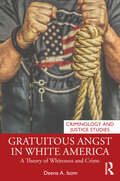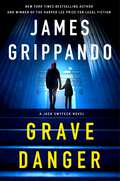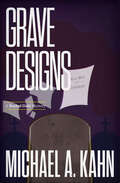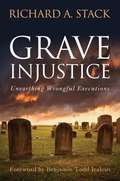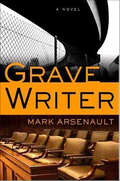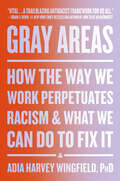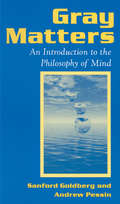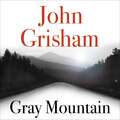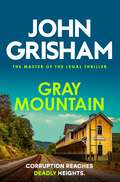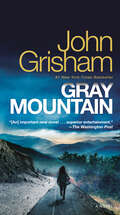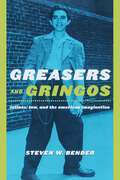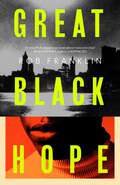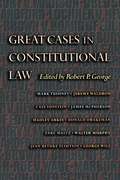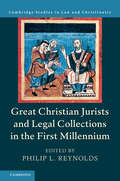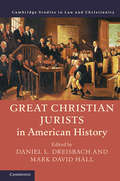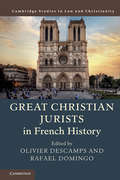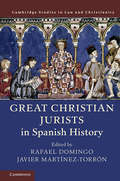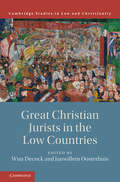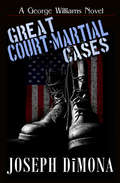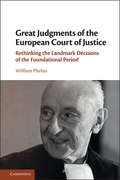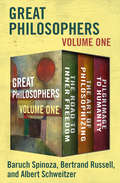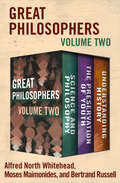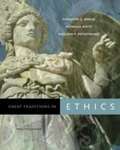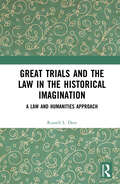- Table View
- List View
Gratuitous Angst in White America: A Theory of Whiteness and Crime (Criminology and Justice Studies)
by Deena A. IsomGratuitous Angst in White America presents a new criminological theory that explains the racialized experiences of white people. Unlike orthodox traditions that assume whiteness as normative or progressive traditions that center the experiences of the marginalized and oppressed, the theory of whiteness and crime flips those perspectives and turns a lens toward white people’s lived experiences and the ideologies of whiteness. The theory of whiteness and crime answers two overarching questions: How does being white impact one’s likelihood of engaging in deviant, criminal, and/or violent behaviors? And, why are white people treated differently than other racial and ethnic groups by the criminal legal system? Through the application of a critical whiteness perspective to criminology, the theory of whiteness and crime is an intersectional and integrated framework that explains within (and between) group differences in negative behaviors and entanglements with the criminal legal system.This book examines the racialized history of America to contextualize the current racial strife in society and inform a more nuanced theoretical approach to explaining disparities. The reader will gain a socio-historical understanding of the depths of the current divides and insight into how such are perpetuated and potentially dismantled. Students will see connections between various theoretical traditions and an application of theory to current social conditions. Researchers will acquire a new theoretical foundation and propositions to ground empirical work that will fill extensive gaps in the criminological literature. And policy makers will see how oversights in understanding the depths of historical significance perpetuate and increase disparities and disadvantages, which are counter to a pursuit of justice.Written in a compelling and direct way, this book will appeal to those in criminology, sociology, race and ethnic studies, gender and sexuality studies, political science, cultural studies, psychology, criminal justice, law, and beyond. Gratuitous Angst in White America is essential for those seeking a more complete understanding of the associations between race and crime and those who want to remedy those disparities. In the end, it is more than a new theory of crime, it is a call to action for all willing to hear.
Grave Danger: A Jack Swyteck Novel (Jack Swyteck Novel #19)
by James GrippandoBestselling author James Grippando’s legendary criminal defense attorney Jack Swyteck is back to defend a single mother accused of kidnapping her own child in a perilous case involving politics and international diplomacy that will test his legal expertise and his marriage. Jack Swyteck’s new client fled Iran to Miami with her daughter, and has been accused of kidnapping by her husband. The seasoned attorney must not only plan a winning defense. To stop the father from taking the girl back to Tehran, Jack must build a case under international law and prove that returning the child would put her at risk.But everything in this case isn’t what it seems, and Jack quickly learns that his client is really the child’s aunt and that the biological mother may have been killed by Iran’s morality police. But what role did the father play in his wife’s death, and why is Jack’s wife, FBI Agent Andie Henning, being pressured by her bosses to persuade Jack to drop the case?Plunging into an investigation unlike any other, Jack must discover who is behind the legal maneuvering and what their interest is. As politics threatens to derail the case and compromise the best interests of the child, Jack and Andie find themselves on opposite sides—with their marriage hanging in the balance. For their relationship to survive, the couple must navigate a treacherous web of deceit that extends from a Miami courthouse to the highest echelons of Washington DC, and spells grave danger at every turn.
Grave Designs: A Rachel Gold Mystery (Attorney Rachel Gold Mysteries #1)
by Michael A. Kahn"With an ear for intelligent, breezy dialogue and clever plotting, Kahn spins an engrossing yarn." —Publishers WeeklyWhen Graham Anderson Marshall III of the prestigious corporate law firm Abbott & Windsor dies, even stranger than his bizarre death is the codicil to his will, which provides a large trust fund for the maintenance of a grave at a pet cemetery. The issue? No one in his family has ever owned a pet—much less one named Canaan. And since Abbott & Windsor is named as the sole beneficiary if the trust is deemed invalid, there is a conflict of interest.They turn to Rachel Gold, the savvy young attorney who left the firm to open her own law office. But before she has a chance to find out what is inside Canaan's coffin at Wagging Tail Estates, the grave is robbed. Teaming up with her best buddy, the brilliant Benny Goldberg, Rachel sets out in search of the stolen contents, following an ominous trail of clues which leads into the heart of a secret legacy of three centuries of blackmail, sexual depravity, and murder. While tracking whatever had been in Canaan's grave, it's soon apparent to Rachel that someone has plans for hers...
Grave Injustice: Unearthing Wrongful Executions
by Richard A. StackOn September 21, 2011, the controversial execution of Georgia inmate Troy Davis, who spent twenty years on death row for a crime he most likely did not commit, revealed the complexity of death penalty trials, the flaws in America’s justice system, and the rift between those who are for or against the death penalty. Davis’s execution reignited a long-standing debate about whether the death penalty is an appropriate form of justice. In Grave Injustice Richard A. Stack seeks to advance the anti–death penalty argument by examining the cases of individuals who, like Davis, have been executed but are likely innocent. By telling the stories of Jesse Tafero, Ruben Cantu, Carlos DeLuna, Cameron Todd Willingham, Larry Griffin, and others, Stack puts a human face on the ultimate and irrevocable tragedy of capital punishment. Although polls indicate Americans favor death sentences approximately three to one, many respondents change their position when presented with the facts about capital punishment. Stack’s compelling descriptions of nineteen wrongful executions illustrate the flaws of the death penalty, which, he argues, is ineffective in deterring crime and costs more than sentences of life without parole. He demonstrates that racial disparities in implementation, procedural errors, incompetent defense attorneys, and mistaken eyewitness identification lead to an alarming number of wrongful convictions. But influencing public opinion is only part of the battle to end state-sanctioned killing. Stack profiles six anti–death penalty warriors, demonstrating the range of what can be done, and what remains to be done, to move toward a more compassionate society.
Gravewriter: A Novel (Billy Povich #1)
by Mark Arsenault"Even better than his Shamus-finalist debut, Spiked." ---Publishers Weekly (starred review) on Speak Ill of the LivingHighly praised by both reviewers and mystery writers, Mark Arsenault introduces a stunning new suspense series with his courtroom drama, Gravewriter.Billy Povich used to be a journalist. He lost his wife because of his gambling habit, and then she died in a car crash. Now he finds himself writing obituaries and living with his elderly father and seven-year-old son, Bo.Billy plans to kill the man who was at the wheel the night of his wife's death. But then a summons to jury duty for a murder trial delays Billy's agenda. As the trial heats up, Billy finds that his little boy spots danger faster than he does, and a frantic and deadly chase begins with Billy as the prey.
Gray Areas: How the Way We Work Perpetuates Racism and What We Can Do to Fix It
by Adia Harvey WingfieldGray Areas has descriptive copy which is not yet available from the Publisher.
Gray Matters: Introduction to the Philosophy of Mind
by Andrew Pessin Sanford GoldbergGray Matters is a thorough examination of the main topics in recent philosophy of mind. It aims at surveying a broad range of issues, not all of which can be subsumed under one position or one philosopher's theory. In this way, the authors avoid neglecting interesting issues out of allegiance to a given theory of mind.
Gray Mountain: A Bestselling Thrilling, Fast-Paced Suspense Story
by John GrishamAmerica's greatest storyteller brings us a new masterpiece of legal courage and gripping suspense - and his finest heroine since The Pelican Brief.Donovan Gray is ruthless and fearless. Just the kind of lawyer you need, deep in small-town Appalachia.Samantha Kofer is a world away from her former life at New York's biggest law firm. If she is going to survive in coal country, she needs to start learning fast.Because as Donovan knows only too well, the mountains have their own laws. And standing up for the truth means putting your life on the line . . .(P)2014 Random House Audio Inc
Gray Mountain: A Bestselling Thrilling, Fast-Paced Suspense Story
by John GrishamCORRUPTION REACHES DEADLY HEIGHTS.The town of Brady is hiding dark secrets.Samantha Kofer had been riding high at a Wall Street law firm - until the recession hit. When she takes a new job in the Appalachian Mountains, she meets fearless lawyer Donovan Gray, who knows only too well the dangers of fighting crime in a lawless mining town.The owners of the mines have been accused of contaminating the water supply. Within weeks of arriving in Brady, Kofer's investigation turns fatal when a plane mysteriously crashes high in the mountains.With threats mounting against her, can Kofer finally find the truth?💥350+ million copies, 45 languages, 10 blockbuster films: JOHN GRISHAM IS THE MASTER OF THE LEGAL THRILLER💥 Readers love Gray Mountain: 'Absolute suspense and drama filled the pages'⭐ ⭐ ⭐ ⭐ ⭐ 'John Grisham at his finest'⭐ ⭐ ⭐ ⭐ ⭐ 'A page-turning read'⭐ ⭐ ⭐ ⭐ ⭐ 'Such a strong female heroine'⭐ ⭐ ⭐ ⭐ ⭐'Wonderful' ⭐ ⭐ ⭐ ⭐ ⭐
Gray Mountain: A Novel
by John Grisham#1 NEW YORK TIMES BESTSELLER • John Grisham has a new hero ... and she&’s full of surprises. The year is 2008 and Samantha Kofer&’s career at a huge Wall Street law firm is on the fast track—until the recession hits and she is downsized, furloughed, and escorted out of the building. Samantha, though, is offered an opportunity to work at a legal aid clinic for one year without pay, all for a slim chance of getting rehired. In a matter of days Samantha moves from Manhattan to Brady, Virginia, population 2,200, in the heart of Appalachia, a part of the world she has only read about. Samantha&’s new job takes her into the murky and dangerous world of coal mining, where laws are often broken, communities are divided, and the land itself is under attack. But some of the locals aren&’t so thrilled to have a big-city lawyer in town, and within weeks Samantha is engulfed in litigation that turns deadly. Because like most small towns, Brady harbors big secrets that some will kill to conceal.Don&’t miss John Grisham&’s new book, THE EXCHANGE: AFTER THE FIRM!
Greasers and Gringos: Latinos, Law, and the American Imagination (Critical America #8)
by Steven W. BenderAlthough the origin of the term “greaser” is debated, its derogatory meaning never has been. From silent movies like The Greaser’s Revenge (1914) and The Girl and the Greaser (1913) with villainous title characters, to John Steinbeck's portrayals of Latinos as lazy, drunken, and shiftless in his 1935 novel Tortilla Flat, to the image of violent, criminal, drug-using gang members of East LA, negative stereotypes of Latinos/as have been plentiful in American popular culture far before Latinos/as became the most populous minority group in the U.S.In Greasers and Gringos, Steven W. Bender examines and surveys these stereotypes and their evolution, paying close attention to the role of mass media in their perpetuation. Focusing on the intersection between stereotypes and the law, Bender reveals how these negative images have contributed significantly to the often unfair treatment of Latino/as under American law by the American legal system. He looks at the way demeaning constructions of Latinos/as influence their legal treatment by police, prosecutors, juries, teachers, voters, and vigilantes. He also shows how, by internalizing negative social images, Latinos/as and other subordinated groups view themselves and each other as inferior. Although fighting against cultural stereotypes can be a daunting task, Bender reminds us that, while hard to break, they do not have to be permanent. Greasers and Gringos begins the charge of debunking existing stereotypes and implores all Americans to re-imagine Latinos/as as legal and social equals.
Great Australian Dissents
by Andrew LynchWhen judges disagree, those in the minority write a dissenting opinion. This book considers the great dissents in Australian law. Their worth may derive from numerous factors, including their rhetorical force as a piece of legal reasoning or emotive power as a judicial lament for the 'error' into which the majority has fallen; the general importance of the issue at stake; as a challenge to the orthodoxy; and, sometimes, the subsequent recognition of a dissenting opinion's correctness and its ultimate vindication. On some occasions, all these features may be strongly present, on others only some. Through a diverse selection of memorable dissenting opinions, this book illuminates the topic of judicial disagreement more generally - not only through examples of instances when minority opinions have been distinctly valuable, but by drawing out a richer understanding of the attributes and circumstances which lead some dissents to become iconic, while so many lie forgotten.
Great Black Hope
by Rob Franklin&‘A beautifully expansive novel about race and class... Franklin's emotional and intellectual range is vast.... An exceptional debut' - Katie Kitamura, author of Intimacies An arrest for cocaine possession in the Hamptons on the last day of a sweltering summer leaves Smith, a young Black Queer graduate, in a state of turmoil. Pulled into the court system and mandated treatment, he finds himself in an absurd but dangerous situation: his class protects him but his race does not. It is just weeks after the death of his beloved roommate Elle, a glamorous member of the Black elite, and he is still reeling from the tabloid spectacle - as well as the lingering question of how well he really knew his closest friend and what happened to her the night she died. When he flees to his hometown of Atlanta and generations of his family of doctors and college presidents and lawyers - the weight of expectations haunts him. Then Carolyn, the closest friend he has left, goes off the rails, Smith returns to New York only to lose himself in his old life, drawn back into the city's underworld. Will his search for the truth about Elle cost him his freedom and his future? Smith goes on a dizzying journey through the New York City nightlife circuit, anonymous recovery rooms, Atlanta's Black society set, police investigations and courtroom dramas, and a circle of friends coming of age in a new era. Great Black Hope is a propulsive, glittering story about what it means to exist between worlds, to be upwardly mobile yet spiralling downward and how to find a way back to hope.
Great Cases in Constitutional Law
by Robert P. GeorgeSlavery, segregation, abortion, workers' rights, the power of the courts. These issues have been at the heart of the greatest constitutional controversies in American history. And in this concise and thought-provoking volume, some of today's most distinguished legal scholars and commentators explain for a general audience how five landmark Supreme Court cases centered on those controversies shaped the country's destiny and continue to affect us even now. The book is a profound exploration of the Supreme Court's importance to America's social and political life. It is also, as many of the contributors show, an intriguing reflection of what some have seen as an important trend in legal scholarship away from an uncritical belief in the essentially benign nature of judicial power. Robert George opens with an illuminating survey of the themes that unite and divide the five cases. Other contributors then examine each case in detail through a lively commentary-and-response format. Mark Tushnet and Jeremy Waldron exchange views on Marbury v. Madison, the pivotal 1803 case that established the power of the courts to invalidate legislation. Cass Sunstein and James McPherson discuss Dred Scott v. Sandford (1857), the notorious case that confirmed the rights of slaveowners, declared that black people could not be American citizens, and is often seen as a cause of the Civil War. Hadley Arkes and Donald Drakeman explore the legacy of Lochner v. New York (1905), a case that ushered in decades of judicial hostility to social welfare laws. Earl Maltz and Walter Murphy assess Brown v. Topeka Board of Education (1954), the famous case that ended racial segregation in public schools. Finally, Jean Bethke Elshtain and George Will tackle Roe v. Wade (1973), still a flashpoint a quarter of a century later in the debate over abortion. While some of the contributors show sympathy for strong judicial interventions on social issues, many across the ideological spectrum are sharply critical of judicial activism. A compelling introduction to the greatest cases in U.S. constitutional law, this is also an enlightening glimpse of the state of the art in American legal scholarship.
Great Christian Jurists and Legal Collections in the First Millennium (Law and Christianity)
by Philip L. ReynoldsGreat Christian Jurists and Legal Collections in the First Millennium is a systematic collection of essays describing how Christian leaders and scholars of the first millennium in the West contributed to law and jurisprudence and used written norms and corrective practices to maintain social order and to guide people from this life into the next. With chapters on topics such as Roman and post-Roman law, church councils, the papacy, and the relationship between royal and ecclesiastical authority, as well as on individual authors such as Lactantius, Ambrosiaster, Augustine, Leo I, Gelasius I, and Gregory the Great, this book invites a more holistic and realistic appreciation of early-medieval contributions to the history of law and jurisprudence for entry-level students and scholars alike. Great Christian Jurists and Legal Collections in the First Millennium provides a fresh look, from a new perspective, enabling readers to see these familiar authors in a fresh light.
Great Christian Jurists in American History (Law and Christianity)
by Mark David Hall Daniel L. DreisbachFrom the early days of European settlement in North America, Christianity has had a profound impact on American law and culture. This volume profiles nineteen of America's most influential Christian jurists from the early colonial era to the present day. Anyone interested in American legal history and jurisprudence, the role Christianity has played throughout the nation's history, and the relationship between faith and law will enjoy this worthy and unique study. The jurists covered in this collection were pious men and women, but that does not mean they agreed on how faith should inform law. From Roger Williams and John Cotton to Antonin Scalia and Mary Ann Glendon, America's great Christian jurists have brought their faith to bear on the practice of law in different ways and to different effects.
Great Christian Jurists in French History (Law and Christianity)
by Rafael Domingo Olivier DescampsFrench legal culture, from the Middle Ages to the present day, has had an impressive influence on legal norms and institutions that have emerged in Europe and the Americas, as well as in Asian and African countries. This volume examines the lives of twenty-seven key legal thinkers in French history, with a focus on how their Christian faith and ideals were a factor in framing the evolution of French jurisprudence. Professors Olivier Descamps and Rafael Domingo bring together this diverse group of distinguished legal scholars and historians to provide a unique comparative study of law and religion that will be of value to scholars, lawyers, and students. The collaboration among French and non-French scholars, and the diversity of international and methodological perspectives, gives this volume its own unique character and value to add to this fascinating series.
Great Christian Jurists in Spanish History (Cambridge Studies in Law And Christianity)
by Rafael Domingo Martínez-Torrón JavierThe Great Christian Jurists series comprises a library of national volumes of detailed biographies of leading jurists, judges and practitioners, assessing the impact of their Christian faith on the professional output of the individuals studied. Spanish legal culture, developed during the Spanish Golden Age, has had a significant influence on the legal norms and institutions that emerged in Europe and in Latin America. <P><P>This volume examines the lives of twenty key personalities in Spanish legal history, in particular how their Christian faith was a factor in molding the evolution of law. Each chapter discusses a jurist within his or her intellectual and political context. All chapters have been written by distinguished legal scholars from Spain and around the world. This diversity of international and methodological perspectives gives the volume its unique character; it will appeal to scholars, lawyers, and students interested in the interplay between religion and law.<P> Includes historical legal biographies of twenty Spanish jurists from a Christian perspective.<P> Written by world class legal historians, half of whom are from Spain.<P> Analyzes what Spanish law has brought to Western culture, including in former colonies.
Great Christian Jurists in the Low Countries (Law and Christianity)
by Wim Decock Janwillem OosterhuisWhat impact has Christianity had on law and policies in the Lowlands from the eleventh century through the end of the twentieth century? Taking the gradual 'secularization' of European legal culture as a framework, this volume explores the lives and times of twenty legal scholars and professionals to study the historical impact of the Christian faith on legal and political life in the Low Countries. The process whereby Christian belief systems gradually lost their impact on the regulation of secular affairs passed through several stages, not in the least the Protestant Reformation, which led to the separation of the Low Countries in a Protestant North and a Catholic South in the first place. The contributions take up general issues such as the relationship between justice and mercy, Christianity and politics as well as more technical topics of state-church law, criminal law and social policy.
Great Court-Martial Cases
by Joseph DimonaGreat Court-Martial Cases is a history of the military trials that shook the nation, from Benedict Arnold to Lieutenant Calley, taken from recently released official trial records.
Great Judgments of the European Court of Justice: Rethinking the Landmark Decisions of the Foundational Period
by William PhelanGreat Judgments of the European Court of Justice presents a new approach to understanding the landmark decisions of the European Court of Justice in the 1960s and 1970s. By comparing the Court's doctrines to the enforcement and escape mechanisms employed by more common forms of trade treaty, it demonstrates how the individual rights created by the doctrine of direct effect were connected to the practical challenges of trade politics among the European states and, in particular, to the suppression of unilateral safeguard mechanisms and inter-state retaliation. Drawing on the writings and speeches of French Judge and President of the Court, Robert Lecourt, it demonstrates that one of the Court's most influential judges shared this understanding of the logic of direct effect. This book offers a distinctive interpretation of the Court of Justice's early years, as well as of the purpose of the fundamental principles of European law.
Great Philosophers Volume One: The Road to Inner Freedom, The Art of Philosophizing, and Pilgrimage to Humanity
by Bertrand Russell Albert Schweitzer Baruch SpinozaEssential teachings, brilliant musings, and provocative theories from three of history&’s greatest thinkers.The Road to Inner Freedom: The seventeenth-century Dutch philosopher Baruch Spinoza views the ability to experience rational love of God as the key to mastering the contradictory and violent human emotions. The Art of Philosophizing: These groundbreaking essays by Bertrand Russell deal with &“the art of reckoning&” in the fields of mathematics, logic, and philosophy. With great clarity and simple exposition, Russell gets to the core of philosophical inquiry and analysis. Pilgrimage to Humanity: Albert Schweitzer discusses his philosophy of culture, the course of his life, his ministry to human needs in Africa, the idea of reverence for life, the ideal of world peace, the significance of liberal Christianity, and the lives, world-views, and contributions of Johann Goethe, Johann Sebastian Bach, and Jesus of Nazareth.
Great Philosophers Volume Two: Science and Philosophy, The Preservation of Youth, and Understanding History
by Bertrand Russell Alfred North Whitehead Moses MaimonidesThree essential philosophers on the nature of reality, the health of the human body, and the meaning of history.Science and Philosophy: An essential introduction to Alfred North Whitehead&’s life and philosophy. From personal reflections to his groundbreaking essay &“Process and Reality&” to an enlightening discussion of Einstein&’s theories, Science and Philosophy is a must-read for anyone seeking to understand one of the modern world&’s greatest thinkers. The Preservation of Youth: Capitalizing on his experience as a physician as well as his knowledge of classical and medieval principles of healing, Moses Maimonides provides a comprehensive theory of wellbeing. In this work he addresses common medical conditions including asthma, diabetes, hepatitis, and pneumonia, and makes recommendations on diet and exercise, sex life, and the underlying psychological causes of illness. Understanding History: Written during the height of World War II, these vigorous essays by Bertrand Russell present his influential theories on the nature of history. The title piece exposes the deadliness of the academic approach to the past, and shows how the reading of history can be a vivid intellectual pleasure.
Great Traditions in Ethics (12th edition)
by Sheldon P. Peterfreund Nicholas P. White Theodore DeniseThis anthology contains readings in Western ethical theory by 27 philosophers from Plato to Bernard Williams. The late Denise (Syracuse U.) et al. begin with a section on classic ethical traditions and topics such as knowledge, virtue, and morality, and conclude with modern continuations and critiques of ideas such as social justice and religion. The introductions to philosophers have been revised, and the appendix on applied ethics (using the preceding readings) has been expanded. There is no index. Annotation ©2007 Book News, Inc., Portland, OR (booknews.com)
Great Trials and the Law in the Historical Imagination: A Law and Humanities Approach
by Russell L. DeesGreat Trials and the Law in the Historical Imagination: A Law and Humanities Approach introduces readers to the history of law and issues in historical, legal, and artistic interpretation by examining six well-known historical trials through works of art that portray them. Great Trials provides readers with an accessible, non-dogmatic introduction to the interdisciplinary ‘law and humanities’ approach to law, legal history, and legal interpretation. By examining how six famous/notorious trials in Western history have been portrayed in six major works of art, the book shows how issues of legal, historical, and artistic interpretation can become intertwined: the different ways we embed law in narrative, how we bring conscious and subconscious conceptions of history to our interpretation of law, and how aesthetic predilections and moral commitments to the law may influence our views of history. The book studies well-known depictions of the trials of Socrates, Cicero, Jesus, Thomas More, the Salem ‘witches’, and John Scopes and provides innovative analyses of those works. The epilogue examines how historical methodology and historical imagination are crucial to both our understanding of the law and our aesthetic choices through various readings of Harper Lee’s beloved character, Atticus Finch. The first book to employ a ‘law and humanities’ approach to delve into the institution of the trial, and what it means in different legal systems at different historical times, this book will appeal to academics, students and others with interests in legal history, law and popular culture and law and the humanities.
